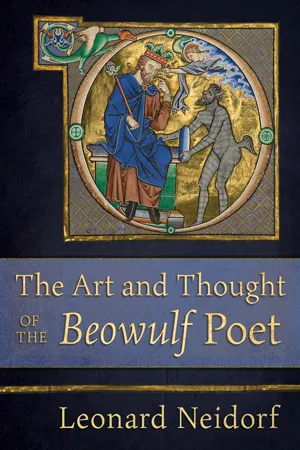
- 210 pages
- English
- ePUB (mobile friendly)
- Available on iOS & Android
The Art and Thought of the "Beowulf" Poet
About this book
In The Art and Thought of the Beowulf Poet, Leonard Neidorf explores the relationship between Beowulf and the legendary tradition that existed prior to its composition. The Beowulf poet inherited an amoral heroic tradition, which focused principally on heroes compelled by circumstances to commit horrendous deeds: fathers kill sons, brothers kill brothers, and wives kill husbands. Medieval Germanic poets relished the depiction of a hero's unyielding response to a cruel fate, but the Beowulf poet refused to construct an epic around this traditional plot. Focusing instead on a courteous and pious protagonist's fight against monsters, the poet creates a work that is deeply untraditional in both its plot and its values. In Beowulf, the kin-slayers and oath-breakers of antecedent tradition are confined to the background, while the poet fills the foreground with unconventional characters, who abstain from transgression, display courtly etiquette, and express monotheistic convictions.
Comparing Beowulf with its medieval German and Scandinavian analogues, The Art and Thought of the Beowulf Poet argues that the poem's uniqueness reflects one poet's coherent plan for the moral renovation of an amoral heroic tradition. In Beowulf, Neidorf discerns the presence of a singular mind at work in the combination and modification of heroic, folkloric, hagiographical, and historical materials. Rather than perceive Beowulf as an impersonally generated object, Neidorf argues that it should be read as the considered result of one poet's ambition to produce a morally edifying, theologically palatable, and historically plausible epic out of material that could not independently constitute such a poem.
Frequently asked questions
- Essential is ideal for learners and professionals who enjoy exploring a wide range of subjects. Access the Essential Library with 800,000+ trusted titles and best-sellers across business, personal growth, and the humanities. Includes unlimited reading time and Standard Read Aloud voice.
- Complete: Perfect for advanced learners and researchers needing full, unrestricted access. Unlock 1.4M+ books across hundreds of subjects, including academic and specialized titles. The Complete Plan also includes advanced features like Premium Read Aloud and Research Assistant.
Please note we cannot support devices running on iOS 13 and Android 7 or earlier. Learn more about using the app.
Information
Table of contents
- Preface
- Introduction
- 1. Kin-Slaying and Oath-Breaking
- 2. Courtesy and Courtliness
- 3. Monotheism and Monstrosity
- Conclusion
- Bibliography
- Index